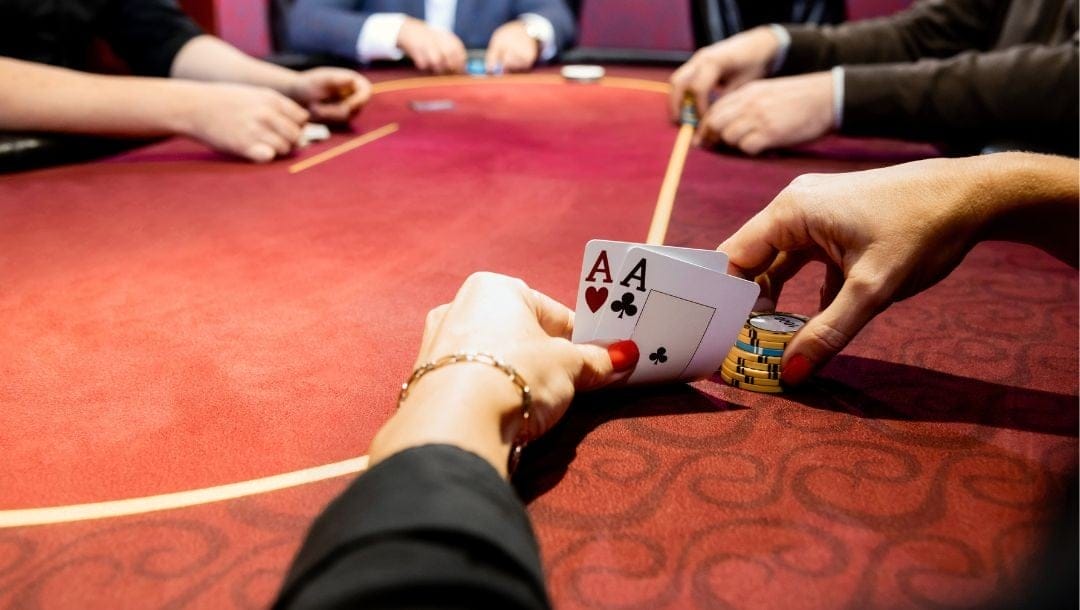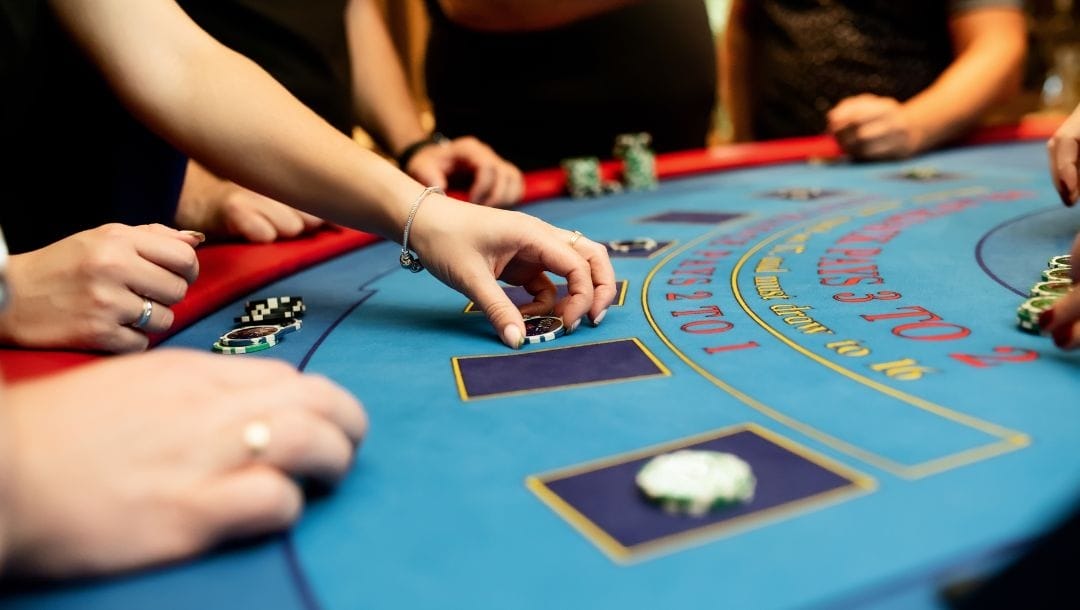Imagine stepping onto the plush floors of a casino, the air buzzing with excitement, the roulette wheels spinning, cards being dealt at lightning speed, and slot machines lighting up with the promise of a jackpot. Now, imagine being armed with an invisible yet powerful weapon: game theory.
Game theory is a mathematical concept that transforms the whims of fortune into the science of strategy. This is the secret sauce of the successful gamblers who approach online casino games not as mere playgrounds of chance but as strategic battlefields of mathematics.
What Is Game Theory?
For the uninitiated, game theory might sound like a complex concept, a mathematical labyrinth navigated only by scholarly minds. But the reality is far more accessible than you might think.
Game theory, in its essence, is the study of mathematical models that analyze and predict the behavior of players in strategic situations.
Think of it as a rulebook for a strategic game where every player wants to win. It’s like chess, where you have to anticipate your opponent’s moves and plan your strategy. But instead of a board game, you’re predicting people’s choices in real-life situations where there’s money involved. The “game” could be anything from a business negotiation, a political decision, or, in this case, a round at a casino table.
So, in layman’s terms, game theory uses models to help players understand how people make decisions and shows how their choices might change based on what they think others will do.
The Role of Game Theorists in Shaping Casino Strategy

Game theorists are akin to the grandmasters of a game of chess. But instead of maneuvering knights and rooks, they manipulate mathematical equations and strategies.
Game theorists act as invaluable compasses in the nexus of strategy and luck that makes up casino games. They help to direct games, so they strike the perfect balance between fair play and making a winning, and their mathematical models and strategic analysis are the keys that can lead to the success of both casinos and players.
Two Types Game Theorists
There are two main types of game theorists who ply their craft for casino games: theoretical and applied.
Theoretical Game Theorists
Theoretical game theorists are voyagers of the abstract, crafting new models and mathematical techniques. Their work is foundational, laying the groundwork for the strategies that can be applied in actual gameplay.
Applied Game Theorists
On the other hand, applied game theorists take these models and techniques and wield them to analyze and resolve real-world situations. Their contribution is manifold: designing new casino games, decoding player behavior, developing effective strategies for games, and improving a casino’s profitability.
What Is Casino Theory and How Do Casinos Use It?

Casino theory is an amalgamation of game theory, probability, and statistics engineered to understand and analyze the dynamics of casino games and player behavior. While it shares some parallels with game theory, casino theory has its own unique application and significance in the context of casinos.
Casinos use this theory as a foundation to design games that strike a balance between fairness and profitability, understand player behavior, develop effective marketing strategies, and preempt fraud.
In practice, a casino manager might make use of this theory to design a new slot machine that appeals to a specific type of player.
Understanding Game Theory as a Player
As a player, casting a glance over the expanse of the casino floor can often evoke the feeling of a sailor facing the vast, unpredictable sea. Mastering innovations of play like game theory can equip you with the navigational tools needed to traverse the turbulent waters of chance and probability and steer your ship towards potential winnings.
House Edge
The house edge, much like the strong, unyielding current, always flows in the favor of the casino — the house. Take, for instance, the house edge in American roulette, which stands resolute at 5.26%. This number implies that the casino expects to glean 5.26% of all bets placed on roulette over an extended period of play. And while the house edge may seem like a formidable foe, with a few strategies up your sleeve, it’s not insurmountable.
Maximizing Odds
The beauty of understanding game theory lies in its capacity to turn the tide of the game in your favor. A seasoned sailor knows how to harness the power of the wind to their advantage, and a skilled casino player can do the same with their understanding of the odds. By understanding the probabilities associated with each potential action, you can make better-informed decisions on when to fold, call, or raise.
Probability
Probability, the study of chance, is as unpredictable as the whims of the weather at sea. Consider a game of blackjack — the likelihood of obtaining a blackjack is a modest 4.82%. With a firm grip on probability, you can better anticipate the ebbs and flows of the game and plot your strategy accordingly.
How To Use Game Theory in Your Casino Strategy
Game theory can be an incredibly valuable tool for casino players, from jackpot slots to poker. Not only does it offer insights into the house edge, but it also helps players develop strategies to greatly improve their chances of winning in various casino games.
Blackjack
In the realm of blackjack, where the house’s edge seems to loom like a menacing shadow, game theory comes in as the proverbial sunbeam to cut through the gloom. Picture this: You’re dealt a hand of 16, the dealer’s upcard is a 9 — now what? This is where game theory waltzes in to guide you.
With game theory, you’re not illegally counting cards like the protagonist from “Rain Man.” Instead, you’re analyzing your situation based on the dealer’s upcard and probability theory, making strategic decisions considering what the dealer might have. Is the dealer likely to bust? Is your hand likely to improve if you hit? Game theory helps you answer these questions.
Slots
When it comes to the dazzling world of online slots, it might seem like Lady Luck holds the reins. But in the glimmering pixelated universe of cherries, gold bars, and numbers spinning at lightning speed, there’s more to it than just random outcomes. With a little understanding of game theory and a good casino strategy, players can demystify the complex algorithms behind slot machines. By considering factors such as payout rates, players can make informed decisions about which slots to play and how much to bet.
Poker
In poker, the knowledge of game theory can be a powerful and indispensable ally, illuminating the path to optimal decision-making. Shedding light on intricate strategies wrapped in the veil of incomplete information. With the guidance of game theory, players learn when to raise the stakes, when to hold their cards close to their chest, and when to bluff their way to victory.
A pro tip: The realm of table games is where game theory truly shines. Here, every move counts, every decision matters, and every strategy shapes the game. From the calculated risks in blackjack to the strategic bets in roulette, game theory offers a mathematical approach to analyzing and predicting the best moves.
Play Casino Games Online With BetMGM
In the high-stakes, nerve-wracking world of online casinos, where fortunes can swing with a roll of dice or a spin of the wheel, game theory stands as the lighthouse guiding players through the stormy seas of uncertainty toward the shores of calculated risk and informed decisions.
Ready to acquire an edge in your casino strategy? Register with BetMGM, where the possibilities are as vast as your strategic ambitions.










